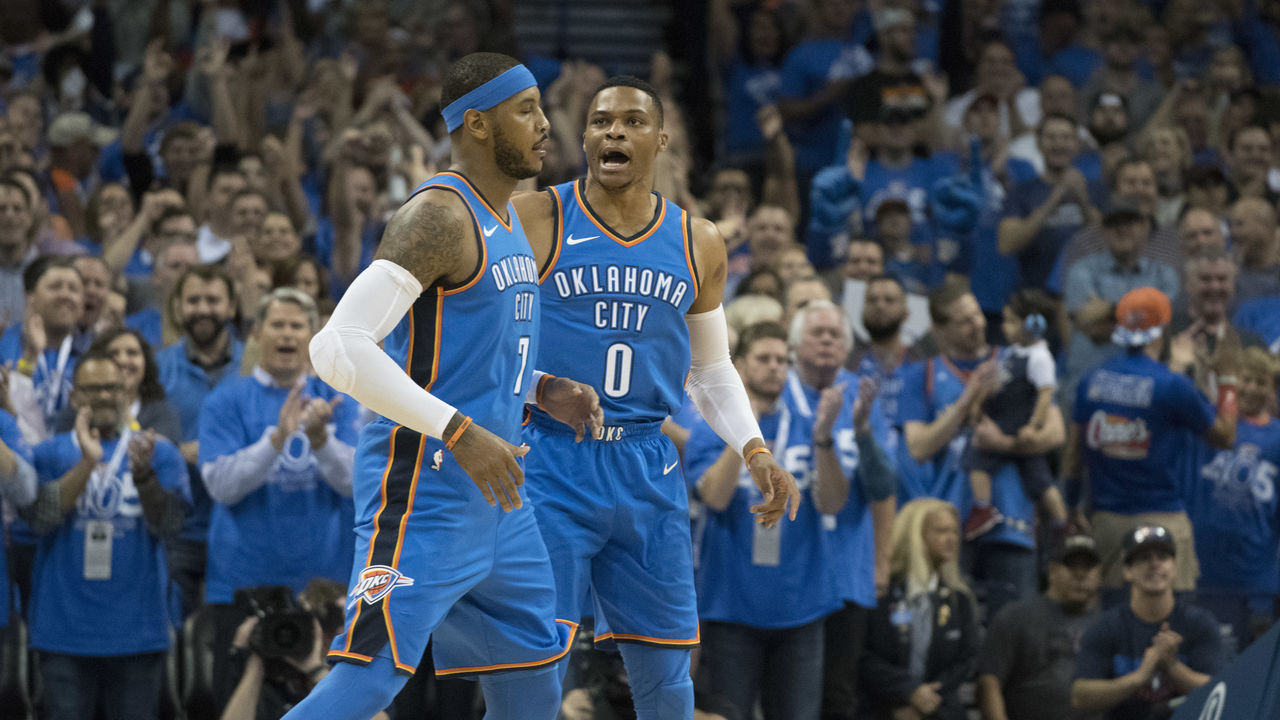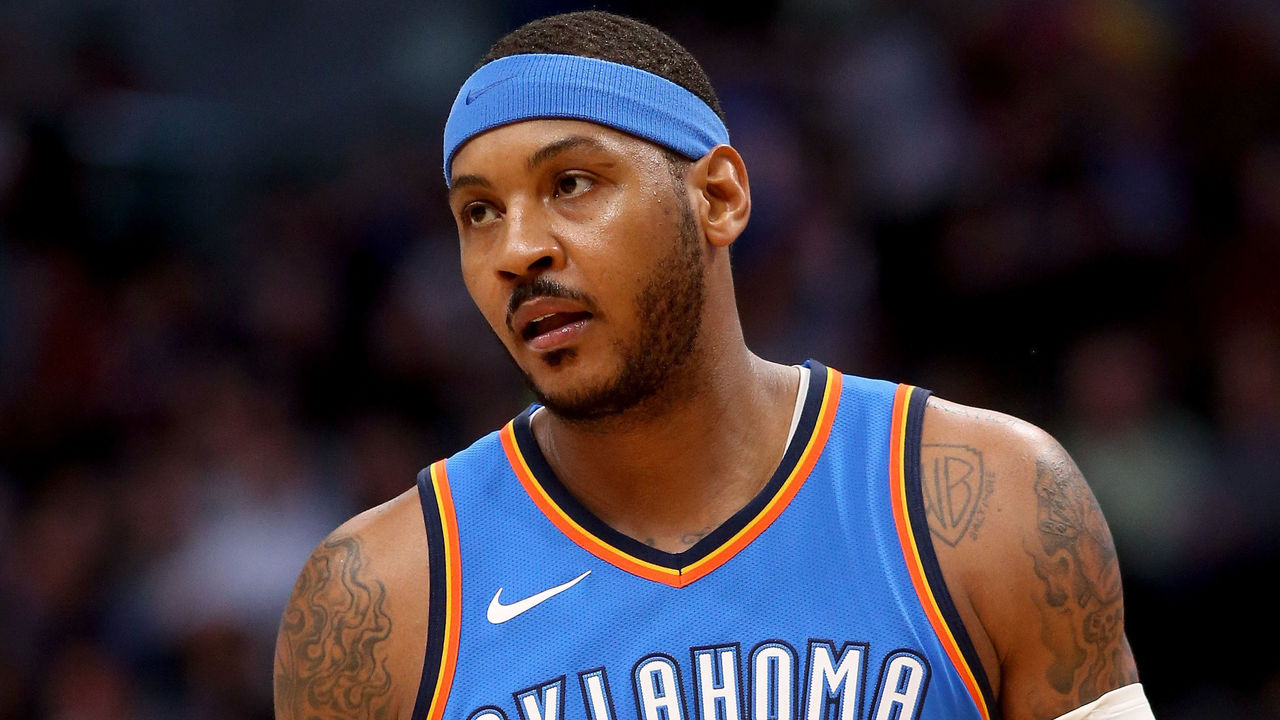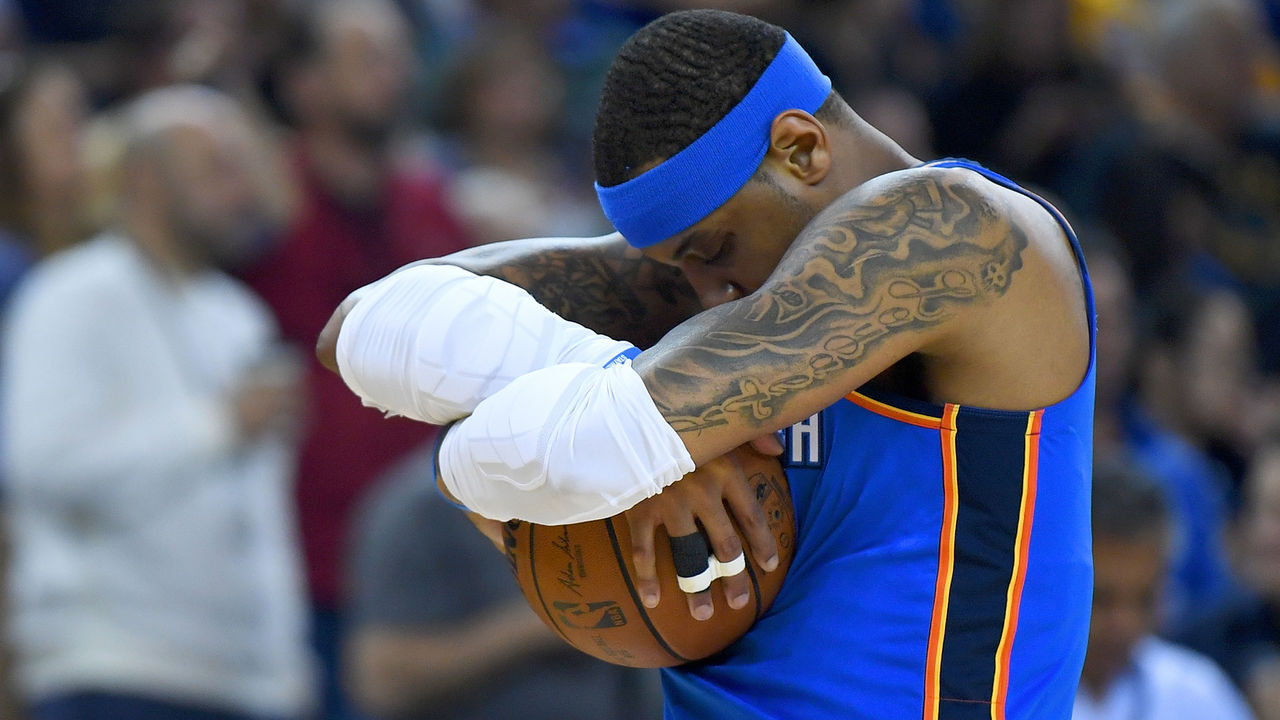How should the Rockets use Melo?
While trailing the Utah Jazz by 10 points with 8:25 left in regulation of Game 6 in the Western Conference first round, the Oklahoma City Thunder pulled Paul George and Carmelo Anthony in favor of Steven Adams and Corey Brewer. After a 75-second breather, George checked back in for Alex Abrines, and would play the final 7:15 alongside Russell Westbrook in a bid to pull the Thunder back from the brink of elimination.
Meanwhile, Anthony remained glued to Oklahoma City's bench - elbows on his knees, with a towel draped over his shoulders, and largely motionless - as his teammates cut the Jazz's lead to three. He finally checked back in with little more than one desperate possession left in the game, and never had another meaningful touch as a member of the Thunder.
Final: Jazz 96, Thunder 91, and an early playoff exit for OKC.
That was effectively the end of the Anthony experiment. What started last summer with the feel-good "Hoodie Melo" sensation ended in ignominy, with the 10-time All-Star relegated to both the literal and metaphorical sidelines.
So, with the Thunder staring down an unprecedented luxury-tax bill that would have pushed their total salary commitment north of $300 million - and with the future Hall of Famer discontent with his role - both sides came to the understanding that a divorce was necessary.
And so here we are. The Thunder traded Anthony to the Atlanta Hawks, who subsequently bought him out in full. Now, the Houston Rockets are expected to bring the 34-year-old into the fold.
There's a lot to unpack. While questions about Anthony's ultimate legacy can't really be answered in the present, the pressing matter is obvious: Exactly how is this going to work in Houston? At this point, there's a full season plus a six-game playoff ouster worth of data suggesting Anthony is no longer worthy of star billing; frankly, his lack of success playing alongside Westbrook and George suggests he may not even be worth third billing.

To figure out what could work for Anthony in Houston's lineup, we've isolated the good and the bad from his 2017-18 campaign in the section below. Unless otherwise noted, all stats are taken from regular-season data.
Overall, lineups featuring Anthony were among the Thunder's most prolific on the offensive end of the floor, scoring 108.9 points per 100 possessions compared to an overall team rating of 106.9. On the other end, however, the Thunder gave up 104.8 points per 100 possessions with Anthony in the fold, up from their overall 10th-ranked rating of 103.9.
Given Anthony's career-long tendencies, those figures aren't a shock, but it's important to note that all Melo lineups in OKC weren't created equal.
The very best in terms of net rating was the Thunder's most-used lineup that featured Anthony, which saw Westbrook playing on the ball, George and Andre Roberson on the wings, and Steven Adams locking down the interior. With that group, OKC outscored its opponents by a whopping 14.4 points per 100 possessions across 539 minutes. Only the Philadelphia 76ers' typical starting unit was more effective (21.0 net rating) in more floor time (600 minutes).
The Thunder's formula wasn't hard to decipher. On offense, Westbrook and George demanded the bulk of the defense's attention when driving, slashing, and pulling up, while the intimidating presence of Adams down low kept defenses from being overly aggressive with help. On the other end of the floor, George and Roberson could stymie the opposing offense at the point of attack while Adams once again took up valuable real estate in the paint. In essence, Anthony was at his best when he had the benefit of being the fourth-most important player at both ends of the floor.
That five-man Thunder unit was perfectly balanced to account for Anthony's limitations, but the results quickly tailed off when too much emphasis was placed on Anthony as a scorer, or when he was tasked with attempting to keep younger, more athletic scoring forwards in check.
For example, the seventh-most-used Anthony lineup saw him alongside all the usual starters, except George was swapped out for Abrines. The move made Anthony that lineup's No. 2 scoring option while making his job on the defensive end considerably more difficult. So, while the lineup with George was plus-14.4 in net rating, the same lineup with Abrines was minus-14.4 points per 100 possessions. Of course, some of that can be attributed to the drop-off from an All-Star in George to a second-year reserve, but a 28.8-point swing is too gigantic to ignore, and Anthony's prominence in those lineups sticks out.
So the question stands: How can the Rockets approximate those successful Melo lineups? And which lineups are a no-go?

Anthony's fit in Houston will likely be far less seamless than it was in OKC. Though the Rockets boast a comparable scoring tandem to Westbrook and George in James Harden and Chris Paul, they won't get to enjoy Anthony's strengths as a third scoring option if they can't find somewhere to stick him on defense. Whereas George and Roberson (when healthy) packed perhaps the best one-two punch among wing defenders in the league, the Rockets' stable is relatively bare after letting Trevor Ariza and Luc Richard Mbah a Moute depart this summer. Paul and restricted free-agent center Clint Capela are good-to-fantastic defenders at their bookend positions, but beyond P.J. Tucker, Houston has little in the way of aggressive, long - and most crucially, switchable - wing defenders.
On paper, the best Melo lineup the Rockets could deploy is Paul and Harden in the backcourt with Anthony alongside Tucker and Capela up front. Here, Anthony could approximate aspects of the role that big man Ryan Anderson has filled - an offense-first, offense-second perimeter catch-and-shoot ace who resembles a matador on the other end. Anthony hit 36.8 percent of his catch-and-shoot 3-pointers last season while Anderson shot 39.5 percent. Meanwhile, the former grades out as a slightly better defender than the flat-footed stretch four, but not by much.
Unfortunately, the Rockets deployed the Paul-Harden-Tucker-Anderson-Capela lineup for a grand total of four minutes last season. With a laughably small sample size and an imperfect comparison to begin with, all anyone can do is guess what would happen with Anthony slotted into the starting unit. Realistically, he'd be a decent secondary scoring option and a complete liability on the defensive end. For a team that already boasts a superb offense, it would be a disappointing step back after posting the league's sixth-best defensive rating in 2017-18, which was especially impressive given it came under under run-and-go guru Mike D'Antoni.
Put another way, if 3-and-D-type players like Ariza and Mbah a Moute couldn't get the Rockets over the hump against the dynastic Golden State Warriors last season, significantly downgrading one end of the floor probably isn't going to move the needle in Houston's favor.

But ultimately, Anthony's usefulness in Houston will only extend as far as his own attitude allows it to. Right up until the Thunder's season-ending press conference, he was adamant about how and when he should be utilized in OKC, forcing Thunder bench boss Billy Donovan between what might've been the best fit for his team - moving Anthony to a reserve role - and kowtowing to the veteran's public declaration that he wouldn't come off the bench.
For what it's worth, Anthony hinted throughout last season that he was becoming more open-minded toward being a secondary scoring option. Whether he'd be content with the 26 minutes per game Anderson averaged for the Rockets last season - even if he starts - remains to be seen.
Anthony's best bet with the Rockets is to at least accept the possibly of not starting. Flexibility is practically a prerequisite for aging gracefully in the NBA. Just ask Dwyane Wade, who came off the bench in all 26 appearances after returning to the Miami Heat for the stretch run last season.
Alternatively, it's easy to draw parallels between Anthony's current career crossroads and that of his former Denver Nuggets teammate Allen Iverson, another once-dominant scorer who went from averaging 26.4 points per game in 2007-08 to out of the league just two years later at age 34. Had Iverson kept his reality in check, the Hall of Famer could likely have stuck around in a sixth-man role for a few more seasons. However, Iverson's general perception of himself as an elite scorer and a starter prevented him from accepting a role as anything less than the focal point - and potentially extending his playing career.
Anthony is already a lock for the Hall of Fame, regardless of whether he eventually captures a ring or retires tomorrow. But for now, both he and the Rockets must figure out where his skill set best fits into their roster.
One can certainly debate whether a 34-year-old Anthony on a buyout-subsidized contract is more valuable to Houston than Ariza and Mbah a Moute making a combined $19.3 million. For their part, the Thunder evidently decided that luxury-tax savings would be more valuable than Melo's on-court contributions.
Of course, the ultimate measuring stick will be whether Houston can finally dethrone the Warriors in the Western Conference. It's a difficult - perhaps impossible - ask, but it won't stop all parties from trying, or stop Anthony from betting on himself, as he's done at every stop of his storied, but not-yet-complete career.
(Photos courtesy: Getty Images)
HEADLINES
- Report: Kings land Hunter from Cavs, send Saric to Bulls in 3-team trade
- Embiid's 40 points lead 76ers past Pelicans after George's suspension
- How should Celtics approach the trade deadline?
- Cavaliers coach Atkinson fined $50K for actions after ejection vs. Suns
- Miller outshines Wemby, Hornets win 6 straight for 1st time since 2016